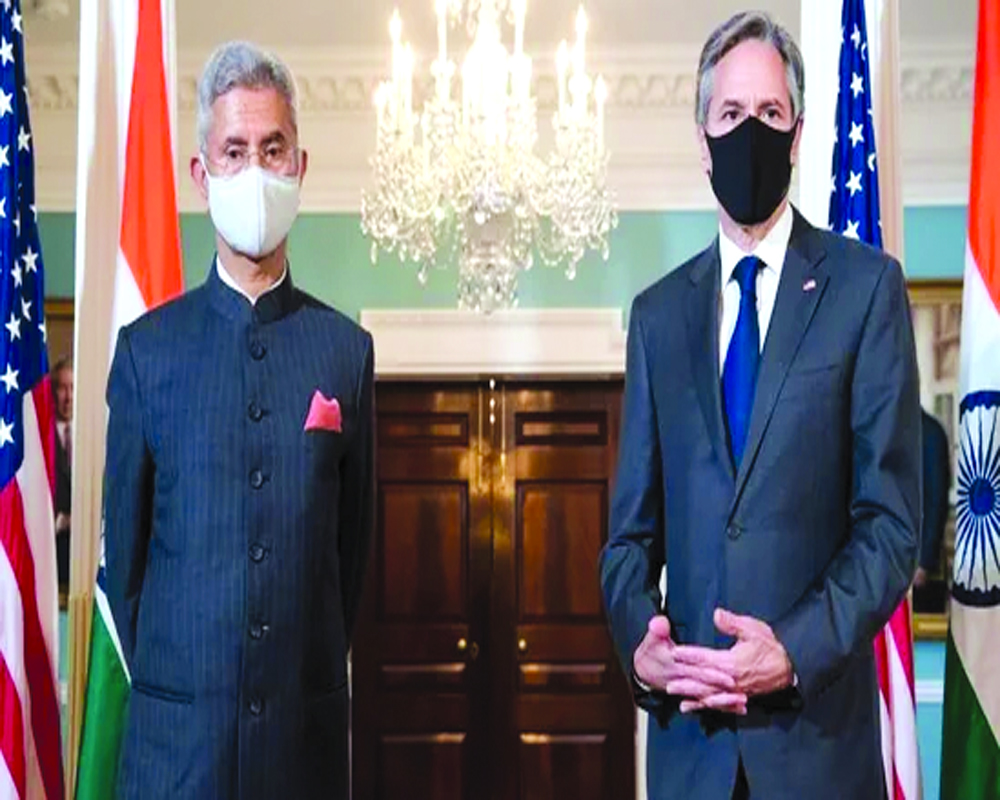The commitment to democratic values reflects India's pluralistic society and history of harmony
Democratic values and free citizenry bind India and the US together, Secretary of State Antony Blinken said in Delhi at the end of talks with External Affairs Minister S. Jaishankar on July 29. The two sides discussed cooperation on a wide range of issues, including Afghanistan, countering Covid-19, the Indo-Pacific strategy, and the Quad. Blinken also met Prime Minister Narendra Modi, National Security Adviser Ajit Doval, members of civil society and a representative of the Dalai Lama.
Modi appreciated US President Joe Biden’s “strong commitment to strengthen the India-US strategic partnership that is anchored in both countries’ shared democratic values and is a force for global good”.
The relationship between the two countries is important because it is a relationship between two democracies. One of the elements that Americans admire most about India is the steadfast commitment of its people to democracy, pluralism, to human rights and fundamental freedoms. Blinken pointed to the free press and independent judiciary as part of the “self-correcting mechanism” that he said could repair challenges to any democracy.
Jaishankar said he had responded to the US concerns on certain issues, making it clear that the “quest” for a more perfect democracy applied to both the US and India. He said the Modi government’s policies “of the last few years” had been done to “right wrongs done historically”, and that while freedoms are important, they should not be “equated with the lack of governance”.
In response to international criticism of the Citizenship (Amendment) Act and the government’s moves on Article 370 in Jammu and Kashmir, the External Affairs Minister has in the past referred to the burden of “accumulated problems” of history, and has defended Internet restrictions as required for maintaining law and order.
On Afghanistan, Blinken and Jaishankar agreed that there was no “military solution” to the conflict, and that taking over the country by force would not help the Taliban gain the “international recognition” or “legitimacy” it desires, including the lifting of sanctions and travel bans against the Taliban leadership. In a reference to Pakistan, Jaishankar said one neighbour of Afghanistan was an “exception” to the consensus for a peaceful political settlement. An Afghanistan that did not respect the rights of its people, and an Afghanistan that committed atrocities against its own people would not be part of the global community, Blinken said.
Both the dignitaries also highlighted cooperation in the Indo-Pacific as part of the ‘Quad’ with Japan and Australia, which Blinken said was “not a military alliance” at all. The two sides also spoke about the Quad’s initiative to provide Indian-made vaccines in the Indo-Pacific region.
Unfortunately, China opposed contact between foreign officials and the Dalai Lama after Blinken met a Tibetan Buddhist monk during his India visit. Blinken met Geshe Dorji Damdul, current director of Tibet House in New Delhi, what was seen as a big political message to China. Damdul, the former interpreter of Tibetan spiritual leader Dalai Lama, was a part of a group of civil society leaders who met US Secretary. Damdul is a director of Tibet House, which was founded in 1965 by the Dalai Lama to preserve and disseminate the unique cultural heritage of Tibet
Meanwhile, Blinken after the meeting civil society leaders, including the Tibetan monk, said that US and India share a commitment to democratic values, which is the bedrock of their relationship and reflective of India's pluralistic society and history of harmony. Civil society helps advance these values," Blinken had tweeted.
(The writer is retired Senior Professor, International Trade and Member, Vivekananda International Foundation, New Delhi. The views expressed are personal.)
























